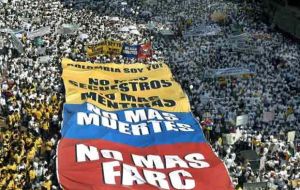MercoPress. South Atlantic News Agency
Colombians protest for end to FARC rebellion
 “No More FARC. No More Deaths. No More Lies. No More Kidnappings. I Am Colombia”
“No More FARC. No More Deaths. No More Lies. No More Kidnappings. I Am Colombia” Millions of Colombians dressed in white marched throughout the country and in major cities worldwide today to express outrage at 40 years of violence and kidnapping by the Revolutionary Armed Forces of Colombia.
Helicopters hovered over Bogota, car horns sounded and workers threw paper from windows as the march, dubbed ''A Million Voices Against the FARC,'' began. Protesters in 27 cities in Colombia and 104 worldwide are marching. Colombian President Alvaro Uribe, who backed the march, has called on citizens to pressure the country's biggest guerrilla group to free its 750 prisoners held in jungle camps. ''The FARC is behind most of the suffering in Colombia,'' said Jaime Vaquero, a Colombian who organized the march in Ottawa, Canada. ''Kidnapping is abominable and the FARC can't remain indifferent to the millions of voices against them.'' The protest has attracted more attention since Venezuelan President Hugo Chavez last month urged that the FARC, classified as a terrorist group by the U.S., be recognized as an ''army'' with legitimate goals. Chavez's call upon governments across Latin America and Europe to recognize the FARC was widely rejected. 'Reject the FARC' ''This is Colombia in its entirety saying no more FARC,'' said Foreign Minister Fernando Araujo in Bogota's Plaza Bolivar before chanting ''no more FARC, no more FARC.'' Organizers said they expect at least 5 million marchers worldwide. Major Ricardo Gomez Blanco, spokesman for the Colombian national police, said it's impossible to estimate how many will join the march, though he said he expects it to be bigger than a July 5 march in which more than 3 million people took part. In Venezuela, protesters filled the Francisco de Miranda avenue, one of the main thoroughfares in eastern Caracas, waving white flags and wearing white T-shirts. ''I came to support the Colombian people,'' said Marianella Col, 56, a housewife from Caracas's Altamira district. ''When Chavez says the FARC aren't terrorists, he's wrong. They're kidnappers and assassins.'' Street vendors in Bogota sold T-shirts emblazoned with the march's slogan: ''No more kidnapping; no more lies; no more deaths; no more FARC.'' FARC Hostages ''I have never sold so many shirts in a single weekend,'' said Emilio Avila, as he handed over three of the T-shirts. Armed with modern weapons and financed by drug funds and ransom payments, the 14,000-strong rebel group incurred widespread anger last month after releasing two women held captive for six years only to seize six tourists four days later. The group released videos and letters from hostages, including former presidential candidate Ingrid Betancourt, chained and looking emaciated. Some were chained by the neck. ''This is very emotional,'' Clara Rojas, former vice presidential candidate and one of the women released Jan. 10, said on RCN television. ''I just hope the FARC listen to this.'' The FARC, which describes itself as the ''People's Army,'' said in a message to Venezuela's Information Ministry yesterday that it will release three more hostages to Chavez. Gloria Polanco de Losada, Luis Eladio Perez and Orlando Beltran Cuellar, all former Colombian lawmakers, will be freed due to poor health, the guerrillas said in the statement. Stand United ''We stand united against the FARC,'' said Lucila Castro, 64, after singing the national anthem. ''No one backs their terrorist ways and hopefully united we can make them change.'' Millions of Colombians protested in July after 11 lawmaker hostages were killed just weeks after Uribe freed 150 guerrillas. The rebels claimed the captives were killed in crossfire after an identified armed group approached the guerrilla camp. Michael Shifter, a vice president of the Inter-American Dialogue, said the march won't have any influence on the guerrilla group, which earns billions of dollars controlling most of the coca production in Colombia. ''They have factored into their strategy that there is widespread revulsion of them,'' Shifter said. ''The march will be a reminder to the world, but the problem won't go away.'' Many companies have given workers time off to join the protest, including Bogota's stock exchange. Trading was suspended today for five minutes as traders went to the streets. ''The march is a rejection of the FARC but also of Chavez,'' Shifter said. ''This will send a strong message to Chavez that Colombia is totally against the FARC and his support of them.'' Colombian guerrillas, paramilitaries and criminal groups hold more than 3,000 hostages who are used to raise funds for weapons purchases and drug trafficking. Military Crackdown Since his election in 2002, Uribe has launched a military crackdown on the FARC and on the smaller National Liberation Army as well as their rightist paramilitary foes. Kidnapping has fallen by 83 percent since 2002 and homicides are down 40 percent, according to government figures. Terrorist attacks are down 76 percent. About 40,000 paramilitary and guerrilla fighters have handed in their weapons in return for reduced jail sentences and job training, according to the government. The FARC first appeared in 1964, when Manuel Marulanda and 48 rebels were attacked by thousands of troops in a jungle hideout and has since battled 11 administrations.




Top Comments
Disclaimer & comment rulesCommenting for this story is now closed.
If you have a Facebook account, become a fan and comment on our Facebook Page!